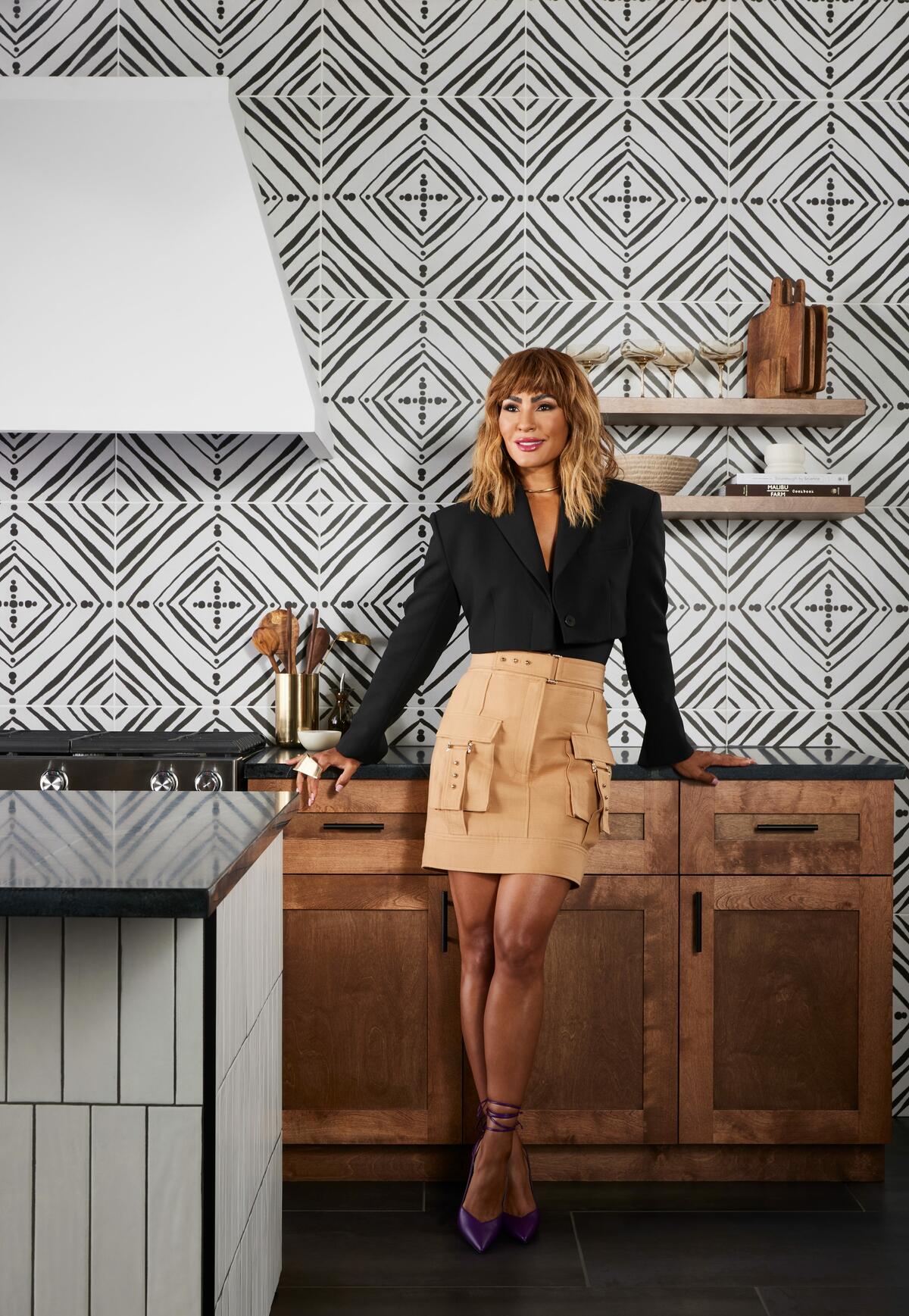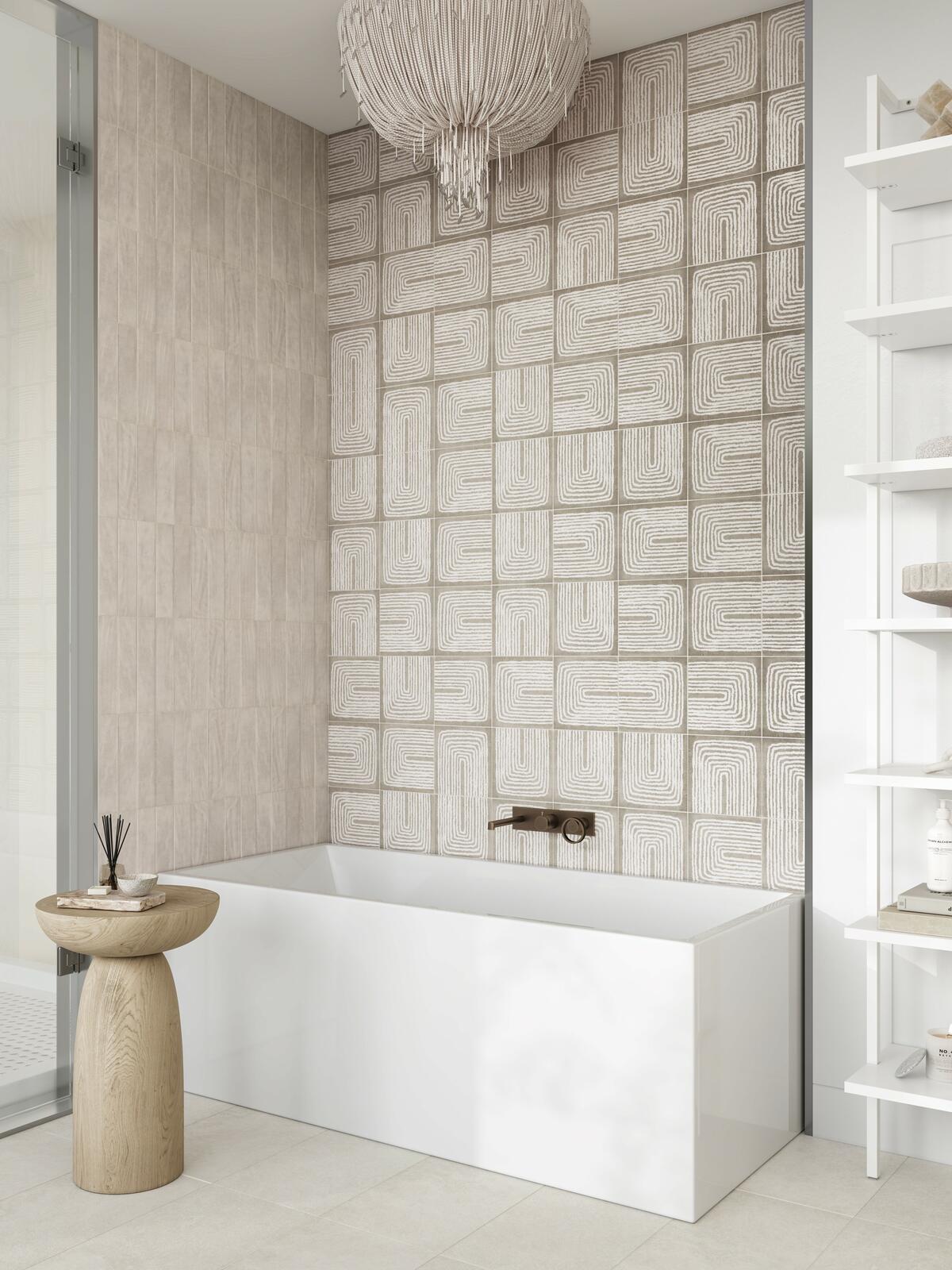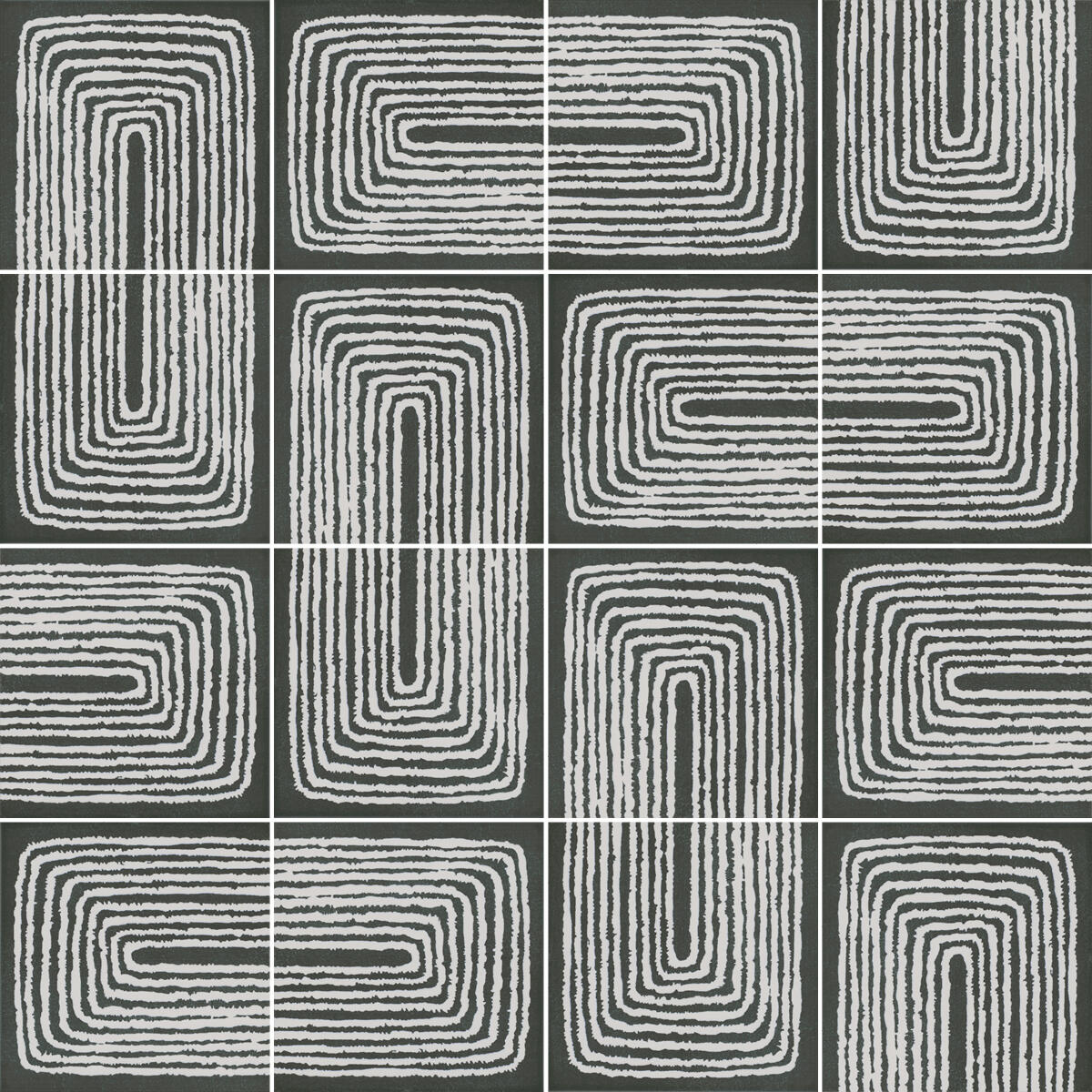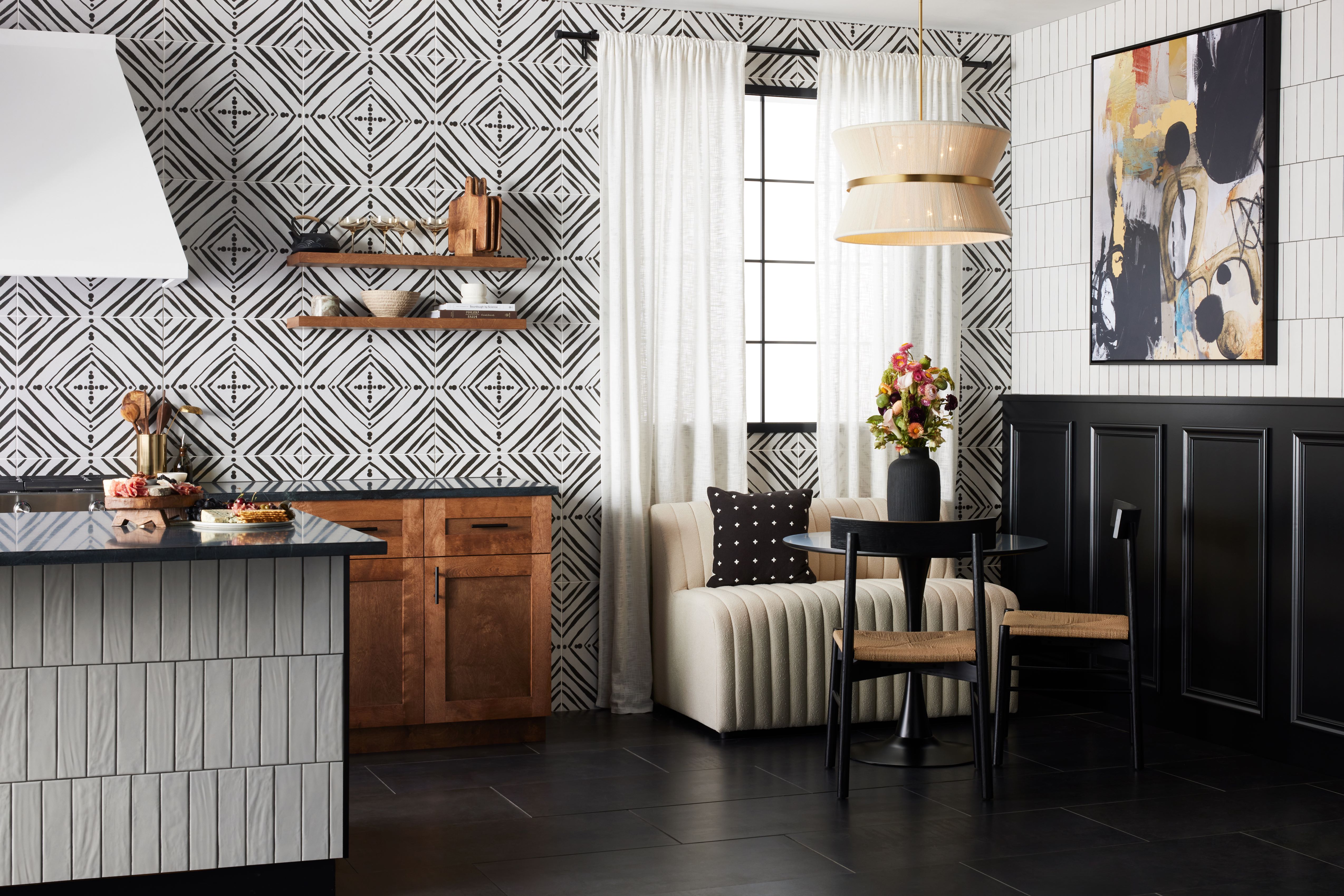Nikki Chu is all about duality. She’s a celebrity designer—famous for her luxe interiors and boldface clientele, as seen on her Unboxed TV series—but she’s a brass-tacks businessperson too, particularly when it comes to product development. No matter how fond she might personally be of, say, a daring pattern in dramatic black, she’s always going to include a version in white, perennially the more popular color. And if a design of hers is performing well in one category, then why not adapt it to others and extend its reach? The Tile Shop, with an eagle eye for innovative yet mainstream talents who balance individual artistry with broad market appeal, knew a good match on sight—in this case, of Chu’s viral Dallas home renovation, which prominently featured the company’s marble tiles in the bathrooms. A collaborative line between the two powerhouses was clearly kismet.

“When they approached me about a partnership, I was like, ‘Yes!’ Because The Tile Shop totally gets my brand, and I get theirs,” says the designer. Consisting of two striking patterns plus an interpretation of the traditional subway tile, all in a tightly curated neutral palette with a matte finish, her debut collection sagely takes inspiration from … Chu herself. “In a marketplace that offers a lot of variety, it can be challenging to stand out. But because I’ve been successful for more than 10 years, I’m able to look at my brand DNA and see what really resonates with my customer,” she explains.
At the top of her hit list is Zulu, initially conceived as a wallpaper that has since become a darling of up-and-coming designers. In its 8-inch-square ceramic Tile Shop translation, a series of seemingly hand-drawn archways can be configured into mesmerizing combinations that range from energetic zigzags to serpentine trails and op-art-ish ovals. “This tile allows you to explore any kind of pattern,” the designer opines. While she’s installing Zulu in one of her own bathrooms in the sandy beige Pumice colorway as a decorative statement on the upper half of the wall, it’s just as captivating in other contexts. As a cocktail bar backsplash, the pattern injects a jolt of personality into an otherwise plain niche. Underfoot, it provides a whole different layer of interest. “I do love putting a busy, bold tile on the floor, so it almost looks like a rug,” she says.
The connective thread to Chu’s brand identity is even more dominant in the collection’s other pattern, the Moroccan-inspired Tangier, which derives from one of her bestselling carpet designs. In the 20-inch-square porcelain tile, organic dots dance within concentric, loose-lined diamonds. “Because of the large scale, it would look beautiful as a full-wall fireplace surround or in a foyer. The substantial size of the individual tiles allows for maximal pattern,” says the designer. For one of her clients, Chu is covering the floor of a lanai in Tangier, complemented by Zulu around the perimeter, both in the charcoal-gray and off-white Graphite colorway for a monochromatic effect.

“Even though I instinctively gravitate toward neutrals, I always add a black-and-white to my palettes, because it’s hard to find a good one that doesn’t feel checkerboardy or cheesy or Vegas,” she says of the darkest shade in the collection. “I’ll use a weathered black with a creamier white so that the juxtaposition is not too stark but still conveys a nice, clean contrast.” To determine what hues to include in her first tile series, Chu consulted with the color experts at The Tile Shop. “I want to make sure I design into what’s successful, so together we looked at what shades people are gravitating to,” she says. “And let’s face it: No matter how many cool colors I could conceive of, the bottom line is, white always sells.” Compared to Graphite, linenlike Pumice presents a more subdued distinction against warm white—“It’s light and airy”—while pale gray Cement skews a touch cooler.
Chu’s neutral palette counterpoises the impact of her graphic patterns, which she softens and streamlines from their historic precedents. A voracious traveler, the designer has observed the diverse cultures of Turkey, Egypt, India and Ghana, countries where she blissfully ambles through local bazaars in search of intriguing textiles. Her worldly outlook is evident in the tiles’ names. To transport the traditional motifs she loves into modern times, she simplifies them, removing embellishments until what remains is a fundamental framework, which she then renders in pleasingly imperfect lines. “It’s how I put my own unique spin on the patterns. They still feel geometric, but they’ve got a comfortable, organic vibe because they’re hand-drawn,” she says. It’s a vibe that’s at home in several aesthetics. “Whether that’s farmhouse, contemporary—these patterns work.”
Perhaps the hardest-working tile of all is the humble subway style. Chu and The Tile Shop call her iteration Luxor. In Egypt, the city is the site of temples and tombs that have endured for centuries; in Chu’s ceramic design, subtle tonal variations and surface undulations express a sense of the eternal. “It has a lot of texture—it’s not just smooth and flat,” she says. Luxor’s color palette of Pumice, Cement and Winter White, in addition to the matte finish, contribute to this impression. “When you think of globally inspired designs, they’re typically distressed; nothing is really high shine,” she adds. “I wanted my tiles to have that more natural appearance.” The designer plans to use Luxor in another bathroom project, applied vertically for a twist, and she suggests experimenting with contrasting grout colors as a way to modernize the stalwart shape. “Darker grout lines against a pale tile make the look more contemporary,” she explains. A versatile basic, Luxor serves as a stand-alone in a shower stall or as a kitchen backsplash, but it can also be used as a border or spacer with Zulu and Tangier.
More Chu styles are forthcoming shortly from The Tile Shop, and all future introductions will complement this original trio—as well as coordinate with the company’s other product lines. For the designer, the possibilities of the partnership are just beginning, and she’s excited about her role as not just a creator but an influencer, demonstrating a diversity of Zulued and Tangiered spaces across her social media platforms. “From indoor to outdoor, kitchen and bathroom, flooring and walls, you could essentially style an entire home with my tile collection,” she says.

This story is a paid promotion and was created in partnership with The Tile Shop.
Homepage image: Nikki Chu’s introductory tile designs are informed by her travels and inspired by her love of graphic patterns in neutral palettes | Courtesy of The Tile Shop





























